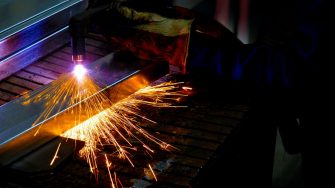
Metals are naturally found in ores as oxides, sulphides, carbonates and other compounds along with impurities or gangue materials. Industrial metals are produced by the two major metallurgical routes – pyrometallurgy and hydrometallurgy. Pyrometallurgical technologies include the thermal treatment of metal ores to extract valuable metals, while hydrometallurgy is based on the use of aqueous chemicals at much lower temperatures.
Pyrometallurgical routes are used in the commercial production of steel, aluminium, metallurgical silicon, manganese, chromium, titanium, and many other metals and alloys. Metal oxides or other compounds are reduced to the metallic state and separated from gangue materials by smelting. Industrial metallurgical processes based on the carbothermal reduction of metal oxides are energy intensive and generate a significant amount of waste materials and greenhouse gases, in particular CO2.
Our research in pyrometallurgical processes targets an increase in the energy efficiency, and decrease in the environmental impact of metals production. Major research areas include:
- reduction of iron, manganese, titanium, aluminium, silicon and chromium ores; smelting and refining
- thermodynamics and kinetics of metallurgical processes
- technologies for iron, steel and ferroalloy making
- environmental issues in pyrometallurgy
- utilisation of low-grade resources in metallurgical processes
- properties of metallurgical melts: metals, slags and fluxes
- properties of cokes and chars in applications in metallurgical processes, including high-temperature strengths of cokes under blast furnace conditions.
Our research in pyrometallurgy is carried out in collaboration with Australian and international metallurgical companies and research organisations, such as Australian Coal Association Research Program (ACARP), BlueScope Steel, BHP, Tasmanian Electrometallurgical Company, Baosteel (China), POSCO (Republic of South Korea), Elkem (Norway), CSIRO, ANSTO, SINTEF (Norway) and others.


